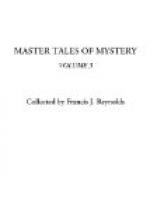“The doctor has succeeded in interesting me greatly in a case which has some unique features,” Kennedy explained. “It has to do with Stephen Haswell, the eccentric old millionaire of Brooklyn. Have you ever heard of him?”
“Yes, indeed,” I replied, recalling an occasional article which had appeared in the newspapers regarding a dusty and dirty old house in that part of the Heights in Brooklyn whence all that is fashionable had not yet taken flight, a house of mystery, yet not more mysterious than its owner in his secretive comings and goings in the affairs of men of a generation beyond his time. Further than the facts that he was reputed to be very wealthy and led, in the heart of a great city, what was as nearly like the life of a hermit as possible, I knew little or nothing, “What has he been doing now?” I asked.
“About a week ago,” repeated the doctor, in answer to a nod of encouragement from Kennedy, “I was summoned in the middle of the night to attend Mr. Haswell, who, as I have been telling Professor Kennedy, had been a patient of mine for over twelve years. He had been suddenly stricken with total blindness. Since then he appears to be failing fast, that is, he appeared so the last time I saw him, a few days ago, after I had been superseded by a younger man. It is a curious case and I have thought about it a great deal. But I didn’t like to speak to the authorities; there wasn’t enough to warrant that, and I should have been laughed out of court for my pains. The more I have thought about it, however, the more I have felt it my duty to say something to somebody, and so, having heard of Professor Kennedy, I decided to consult him. The fact of the matter is, I very much fear that there are circumstances which will bear sharp looking into, perhaps a scheme to get control of the old man’s fortune.”
The doctor paused, and Craig inclined his head, as much as to signify his appreciation of the delicate position in which Burnham stood in the case. Before the doctor could proceed further, Kennedy handed me a letter which had been lying before him on the table. It had evidently been torn into small pieces and then carefully pasted together.
The superscription gave a small town in Ohio and a date about a fortnight previous.
* * * * *
Dear Father [it read]: I hope you will pardon me for writing, but I cannot let the occasion of your seventy-fifth birthday pass without a word of affection and congratulation. I am alive and well—Time has dealt leniently with me in that respect, if not in money matters. I do not say this in the hope of reconciling you to me. I know that is impossible after all these cruel years. But I do wish that I could see you again. Remember, I am your only child and even if you still think I have been a foolish one, please let me come to see you once before it is too late. We are constantly traveling from place to place, but shall be here for a few days.




